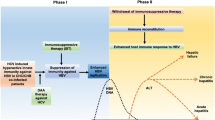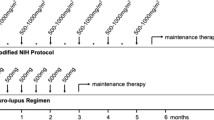Abstract
A 46-year-old male was admitted to our hospital with severe acute hepatitis, hypereosinophilia, and serum immunoglobulin G4 (IgG4) elevation. Plasma exchange was performed, and he was treated by prednisolone; however, his hepatitis recurred twice over the following twelve months. Transjuglar liver biopsy was performed at the third onset, which demonstrated extensive hepatocyte necrosis, congestion, and severe eosinophil infiltration. We diagnosed hypereosinophilic syndrome (HES)-related hepatitis. Although no cholangitis was detected by imaging and pathological diagnosis, IgG4-positive cells were detected in the liver and bone marrow. Furthermore, the elevation of serum IgG4 levels was associated with the eosinophil count and his clinical condition. After the addition of azathioprine to his treatment regimen, no reoccurrence was observed. IgG4-positive cells may have contributed to the severity and refractoriness of this recurrent acute HES-related hepatitis.


Similar content being viewed by others
References
Fauci AS, Harley JB, Roberts WC, Ferrans VJ, Gralnick HR, Bjornson BH. NIH conference. The idiopathic hypereosinophilic syndrome. Clinical, pathophysiologic, and therapeutic considerations. Ann Intern Med. 1982;97(1):78–92.
Podjasek JC, Butterfield JH. Mortality in hypereosinophilic syndrome: 19 years of experience at Mayo Clinic with a review of the literature. Leuk Res. 2013;37(4):392–5.
Valent P, Klion AD, Horny HP, Roufosse F, Gotlib J, Weller PF, et al. Contemporary consensus proposal on criteria and classification of eosinophilic disorders and related syndromes. J Allergy Clin Immunol. 2012;130(3):607–12.
Ung KA, Remotti H, Olsson R. Eosinophilic hepatic necrosis in hypereosinophilic syndrome. J Clin Gastroenterol. 2000;31(4):323–7.
Spry CJ, Davies J, Tai PC, Olsen EG, Oakley CM, Goodwin JF. Clinical features of fifteen patients with the hypereosinophilic syndrome. Q J Med. 1983;52(205):1–22.
Foong A, Scholes JV, Gleich GJ, Kephart GM, Holt PR. Eosinophil-induced chronic active hepatitis in the idiopathic hypereosinophilic syndrome. Hepatology. 1991;13(6):1090–4.
Gleich GJ, Leiferman KM. The hypereosinophilic syndromes: current concepts and treatments. Br J Haematol. 2009;145(3):271–85.
Baccarani M, Cilloni D, Rondoni M, Ottaviani E, Messa F, Merante S, et al. The efficacy of imatinib mesylate in patients with FIP1L1-PDGFRalpha-positive hypereosinophilic syndrome. results of a multicenter prospective study. Haematologica. 2007;92(9):1173–9.
Metzgeroth G, Walz C, Erben P, Popp H, Schmitt-Graeff A, Haferlach C, et al. Safety and efficacy of imatinib in chronic eosinophilic leukaemia and hypereosinophilic syndrome: a phase-II study. Br J Haematol. 2008;143(5):707–15.
Butterfield JH. Interferon treatment for hypereosinophilic syndromes and systemic mastocytosis. Acta Haematol. 2005;114(1):26–40.
Lamers MM, van Oijen MG, Pronk M, Drenth JP. Treatment options for autoimmune hepatitis: a systematic review of randomized controlled trials. J Hepatol. 2010;53(1):191–8.
Mahajan VS, Mattoo H, Deshpande V, Pillai SS, Stone JH. IgG4-related disease. Annu Rev Pathol. 2014;9:315–47.
Yamamoto M, Takahashi H, Suzuki C, Tabeya T, Ohara M, Naishiro Y, et al. Analysis of serum IgG subclasses in Churg–Strauss syndrome––the meaning of elevated serum levels of IgG4. Intern Med. 2010;49(14):1365–70.
Nagao Y, Yamanaka H, Harada H. A patient with hypereosinophilic syndrome that manifested with acquired hemophilia and elevated IgG4: a case report. J Med Case Rep. 2012;6:63.
Nagamura N, Ueno S, Fujishiro H, Oonuma H. Hepatitis associated with hypereosinophilia suspected to be caused by HES that also presented with the pathological features of IgG4-related disease. Intern Med. 2014;53(2):145–9.
Clayton F, Fang JC, Gleich GJ, Lucendo AJ, Olalla JM, Vinson LA, et al. Eosinophilic esophagitis in adults is associated with IgG4 and not mediated by IgE. Gastroenterology. 2014;147(3):602–9.
Umehara H, Okazaki K, Masaki Y, Kawano M, Yamamoto M, Saeki T, et al. Comprehensive diagnostic criteria for IgG4-related disease (IgG4-RD), 2011. Mod Rheumatol. 2012;22(1):21–30.
Deshpande V, Zen Y, Chan JK, Yi EE, Sato Y, Yoshino T, et al. Consensus statement on the pathology of IgG4-related disease. Mod Pathol. 2012;25(9):1181–92.
Okazaki K, Uchida K, Ikeura T, Takaoka M. Current concept and diagnosis of IgG4-related disease in the hepato-bilio-pancreatic system. J Gastroenterol. 2013;48(3):303–14.
Disclosures
Conflict of Interest:
Tomonori Aoyama, Toshiharu Matsumoto, Akira Uchiyama, Kazuyoshi Kon, Shunhei Yamashina, Satoko Suzuki, Kenichi Ikejima, Takashi Yao, Ryohei Kuwatsuru and Sumio Watanabe declare that they have no conflict of interest.
Human/Animal Rights:
All procedures followed were in accordance with the Helsinki Declaration of 1975, as revised in 2008(5).
Informed Consent:
Informed consent was obtained from the patient for inclusion in the study.
Author information
Authors and Affiliations
Corresponding author
Rights and permissions
About this article
Cite this article
Aoyama, T., Matsumoto, T., Uchiyama, A. et al. Recurrent severe acute hepatitis caused by hypereosinophilic syndrome associated with elevated serum immunoglobulin G4 levels . Clin J Gastroenterol 7, 516–522 (2014). https://doi.org/10.1007/s12328-014-0532-0
Received:
Accepted:
Published:
Issue Date:
DOI: https://doi.org/10.1007/s12328-014-0532-0




